Mugen Souls Review
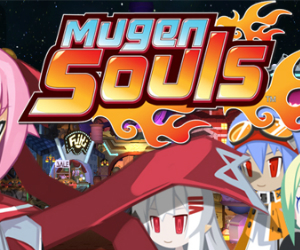 Game: Mugen Souls
Game: Mugen Souls
Developer: Compile Heart
Publisher: NIS America, Reef Entertainment
Available On: PlayStation 3 only
Mugen Souls describes itself as an “over-the-top, overwhelming RPG!” (exclamation mark included), and it’s probably worth noting that neither of those things are necessarily good. Over-the-top things are often improved by a little restraint, and overwhelming things quickly become numbing. Still, they are terms that accurately describe Mugen Souls, though it’s probably best not to imagine the kinds of questions that were asked during development. “Are these voices squeaky enough?” “Are there enough rainbows?” “Can we have more boob jokes?”.
STORY: Like many JRPGs, Mugen Souls is a story about a seemingly unstoppable megalomaniacal force hell-bent on taking over the galaxy. Unlike many JRPGs, however, you are that megalomaniacal force, and your enemies are the adorable munchkins who stand in your way. As Chou-Chou, you wake up one morning and decide to take over the galaxy, and thus begins a colourful (if repetitive) quest across seven worlds in which you assimilate, charm or destroy every creature that stands in your way.
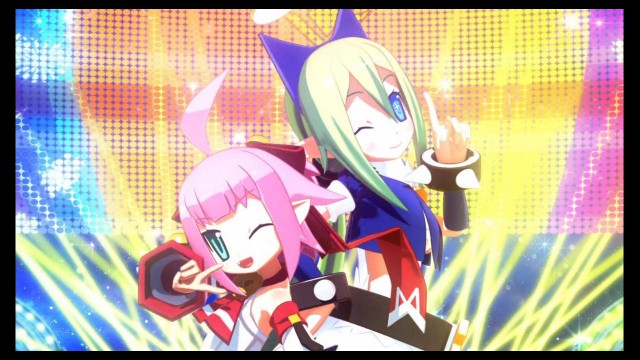
Chou-Chou is a bossy “Undisputed God”, and her reasoning for taking over the galaxy is apparently that “each of the worlds [within it] has unique, beautiful features”, so don’t expect an emotional journey. Her companions are angelic ex-demon Altis, whose defining characteristic is a prominent underboob (tastefully bandaged on the game’s cover for some reason) and Ryuto, a complete bonehead who’s utterly devoted to Chou-Chou in every possible way. The party can be fleshed out with peons, customisable characters you can create once you’ve charmed enough enemies using various aspects of Chou-Chou’s cartoon sexuality; more of that later.
Every aspect of the story is played for laughs, and whether you find it funny or not will depend on whether a princess being captured and paraded around in a humiliatingly tiny bikini while everyone else either laughs at her embarrassment or gets aroused, is your idea of a joke. Most of the dialogue is about sex, fetishism or nudity, and since the object of the central gameplay mechanic is to make everyone want a piece of Chou-Chou, it’s not exactly out of place, but since it never really lets up, it does begin to grate after a few hours.
A lengthy scene about ten minutes into the game shows Chou-Chou and Altis taking a bath and asking Ryuto to join them, which he finds so exciting that he is stricken by an explosive nose bleed (“The Red Ryuto Geyser!”). It’s faintly amusing but, more importantly, it is a sign of things to come: If the combination of smut and extremely child-like characters doesn’t appeal to you, give Mugen Souls a wide berth.
There’s certainly no cause for moral outrage. If you’re a member of the game’s target audience, you’ll know that the characters are chibis, not children. Still, it’s worth making clear in this review that “due to the sensitive nature of some content, NIS America has decided to edit certain aspects of this title for its North American and European releases” (source). Purists won’t welcome the censorship, but a quick YouTube search for the omitted content (I’m not going to link to one here) reveals that this was probably a sensible commercial decision: Western audiences are undoubtedly “sensitive” to the overt sexualisation of cartoon characters who look like children.
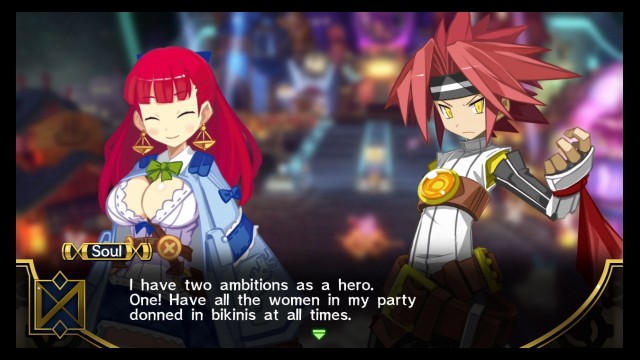
Tasteless as some may find the treatment of just about every female character in the game, that’s not really what’s wrong with Mugen Souls’ story. No, the problem is rather that the story is utterly lacking in intrigue, heart and depth. It’s a forty-hour pop video interspersed with inane dialogue and laboured, overlong sketches about perversion. In a casual game, this wouldn’t matter, but a complete lack of substance is a problem in a JRPG. A lengthy game that requires dedicated play cannot rely on aesthetic alone to keep players interested in anything other than battles, but that’s precisely what Mugen Souls does, and it’s hard to be patient with it as a result.
GRAPHICS: The seven worlds Chou-Chou must conquer are as follows: “Yellow, shining sun world, Orange, glowing moon world, Red, vivid fire world, Indigo frosted water world, Green, Tropical tree world, Blue, advanced metal world and Violet, earthen soil world”. The design takes its cue from this premise, and indeed Mugen Souls is a riot of rainbow-coloured excess, eye-catching even by JRPG standards. The G-Castle hub is a bizarre cartoon mismatch of objects, and character customisation is enriched by a vast number of detailed clothing and accessory choices.
It’s a shame, therefore, that presentation is lacking, particularly when it comes to the main environments, which are flat, fuzzy, and plagued by a low frame rate, pretty unforgivable in areas of low complexity displayed in a PlayStation 3-exclusive game. The camera in the free-roaming areas is also dreadful: If you don’t touch it, it remains stationary in relation to Chou-Chou’s position, rendering it useless as soon as you change direction. The “move” and “zoom” functions are awkwardly implemented and counter-intuitive, so you’ll probably end up using the minimap to navigate. Since so much of a JRPG’s appeal is in exploration, this severely impacts on immersion and your overall enjoyment of the game.
SOUND: Your tolerance of Mugen Souls’ relentlessly upbeat soundtrack depends entirely on whether or not you like J-pop. Those who do will enjoy the odd catchy track and forgive the repetition of the battle theme. Those who don’t would be best off finding something else to listen to while they play. The voiceovers are fairly decent in both English and Japanese – giving Chou-Chou’s various incarnations different voices is a nice touch – but those who prefer a Japanese dub will need to use their imaginations at certain points as not everything is subtitled. Although the things that aren’t (song-lyrics and Chou-Chou’s catchphrases during her Moe Kills) are not crucial to your understanding of the game, it’s something you’ll miss, even though it’s not a fair criticism since it’s hard to localise text that never appeared in the original version of the game.
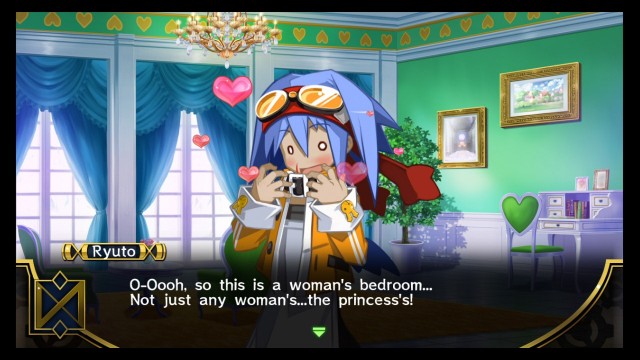
Only two aspects of the sound itself really warrant criticism. One is the repetition of various one-liners during battle. Ryuto’s “watch me, Lady Chou-Chou!” is probably the most annoying, but none of them are good enough to be funny after the 500th repetition. The other is the noise the “Explanatory Shampuru” makes whenever he says anything. Given that he explains all the gameplay mechanics (the clue is in the name), he says things a lot. Any piece of “explanation” requires at least ten lines of dialogue, and each one will be accompanied by the noise “peeyeew!” (perhaps meant to be “peon”), uttered in a squeaky rabbit-voice.
If I’ve made this sound amusing, I haven’t meant to.
GAMEPLAY: Though it certainly has its own flavour, Mugen Souls’ gameplay contains nothing a JRPG aficionado won’t have seen before. Turn-based battles require you to move your party around the field, either attacking, performing a special move or linking an attack with another member of the party. Positioning characters is key to victory, since each attack has its own range, and a close proximity to another character means you’re more likely to be able to pull off a linked move. Certain attacks can also propel enemies into other enemies, increasing damage and swinging the odds in your favour.
Where Mugen Souls departs from a well-used template is in its Moe Kill system, which requires you to use Chou-Chou’s various personas to charm enemies into becoming her peons or turn them into rare items. The idea of manipulating or recruiting enemies in this way is not a new one, but Mugen Souls puts its own spin on it. Chou-Chou has eight personalities in total, her default “Ego” personality, and seven more: Terse, Ditz, Hyper, Graceful, Bipolar, Sadist and Masochist. The idea is that each being she meets will have an affinity for one of these types, and to successfully execute a Moe Kill, you have to guess which personality to use and then say things that will make the monster weak at the knees, or yield a valuable item. Fail, however, and you’ve got a difficult fight on your hands.
Once you’ve chosen your phrases, you’re given an animation that shows Chou-Chou dispensing the punishment/love/whatever. One, two, or all three of the monster’s mood gauges (one that represents its wish to become her peon, one that represents how close it is to turning into an item and another that shows how close it is to “frenzy”, which you’ll want to avoid) will increase. If one of them fills up, the sequence is over. If none of them do, the monster lives on, and you can try again when it’s Chou-Chou’s turn again.
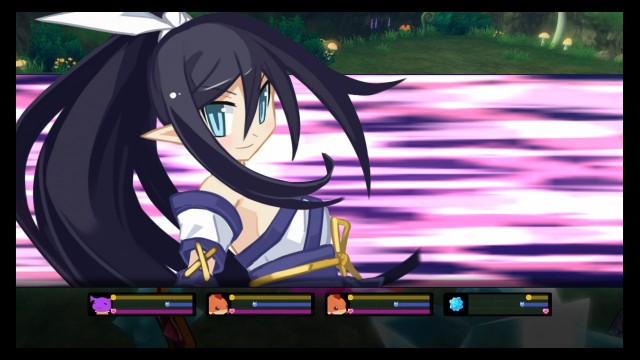
It’s a nice idea, but the execution is a little frustrating, rooted more in guesswork than logic. Each monster has a temperament and a mood (which is represented by different-coloured smiley/frowny/sicky face), and you have to put the two together to figure out what’s going to press its buttons; so to speak. This is easier said than done: While it’s easy enough to guess what’s going to work on a happy masochist, things get a bit more confusing when you’re faced with a confused “graceful” monster.
A Moe Kill consists of three phrases, each of which you choose from a selection, but it’s not always clear what these mean. “Abuse” and “Hit” are pretty straightforward, but “Crybaby” is a bit more ambiguous. Is Chou-Chou the crybaby, or is she telling the monster that it’s a crybaby? Equally confusing is the fact that despite having eight personalities, Chou-Chou only has a small handful of phrases. This is not only makes little sense (why doesn’t each personality have unique phrases?) but it also makes it hard for you to judge how much of your affect on the monster is down to the personality you’re using, or the phrase you’re saying.
The awkwardness of this system isn’t just a problem in its own right, it impacts on the overall battle system and your ability to form a coherent strategy. Since you can only attempt a Moe Kill on living enemies, you’ll find yourself telling everyone other than Chou-Chou to “defend” turn after turn for the sake of keeping enemies alive just so you can try and Moe Kill them again. This means turns often become irritating obstacles that you’ll want to skip, rather than the precious resources they should be.
Successful Moe Kills in battle allow you to create your own peons back in the G-Castle, who can then be taken into battle. Creating a peon is fun, especially if the art style appeals to you, because you’ll get to customise every aspect of their appearance, a sort of “Build-a-Chibi” minigame; except with stats. A well-levelled peon is an asset to battle, which is something to bear in mind when you’re tearing your hair out after yet another failed Moe Kill.
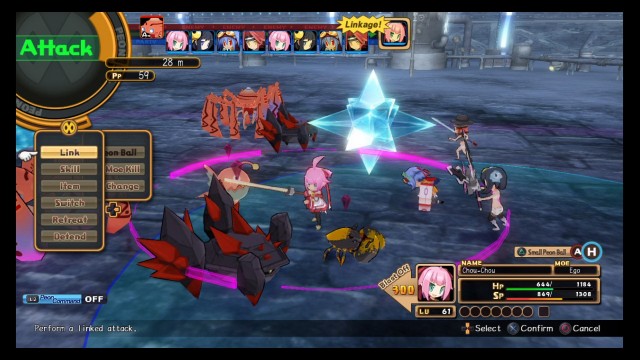
Other mechanics, such as the slightly pervy “hot springs” levelling system, the “Rock, Paper, Scissors” ship-fighting minigame and the riddle-based world-conquering system, all serve their purpose without being remarkable. The only other thing really worth mentioning are the ridiculous load times before each battle, as baffling as the low frame rate in this low-complexity PlayStation 3 exclusive.
LONGEVITY: This is a fairly standard JRPG in terms of longevity, and if you can put up with the story, characters, music, graphics and loading times, you’re looking at upwards of forty hours. Designing and levelling an army Peons and saving up enough cash to buy Chou-Chou more clothes for her kinky wardrobe also adds a creative edge to grinding.
VERDICT: Mugen Souls is a curiosity, worth a try if you’re a fan of NIS America’s other titles (or you just like your JRPGs really Japanese), but hard to recommend to anyone else. Second-rate presentation, shallow characters, a flimsy plot and trial-and-error gameplay will frustrate all but the genre’s most dedicated fans, and the headache-inducing aesthetic and hyperactive characters are likely to grate on everyone except the children who are too young for the game’s decidedly adult “humour”. The game isn’t wholly bad, but it’s annoying, repetitive and, ironically enough, pretty soulless.






